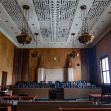Bryce Dixon arrived at the University of Southern California (USC) as a top-rated football tight end from Ventura, California, in 2014. The following spring, he was expelled for violating the University’s “affirmative consent” policy by engaging in nonconsensual sex with a student athletic trainer. He challenged his expulsion in Los Angeles Superior Court, claiming he did not receive due process during the University’s investigation. A judge put his expulsion on hold and said he could continue his education, but he was not allowed to play football. He did not return to USC the following year.
This scenario was just the beginning of Dixon’s legal troubles. While still at USC, he was arrested for participating in two robberies, a carjacking and using a knife during a robbery. Four months later, he “pleaded no contest to the charges,” according to the Los Angeles Times. He was then permanently expelled from the University and sentenced to a term of six years at the California Rehabilitation Center, a state prison in Norco. He was eligible for parole in 2021. While in custody, in 2017 he petitioned USC for ignoring “substantial evidence” in his favor during the university’s review of his sexual activity.
When his petition came before the appellate court, USC was blamed for turning over Dixon’s case to Dr. Kegan Allee, a single investigator who also acted as “prosecutor, factfinder and sentencer.” The University responded by claiming that no California case “required a private university to conduct a live hearing or permit the responding student to conduct and cross-examine either the complainant or witnesses.” USC also noted that substantive changes were being made after the enactment of Title IX, which prevents “discrimination based on sex in educational programs or activities that receive federal financial assistance.”
Then things for Dixon took a positive turn when California’s Second District Court of Appeal found USC’s Title IX review process was “fundamentally flawed” in 2019, and reversed his expulsion because USC “failed to provide him with a fair hearing” during which he should have been allowed to cross-examine witnesses…before a neutral adjudicator…”
The good news did not last long. Two years later, in 2021, Dixon sued USC, claiming that his alleged Title IX violations were “tainted by anti-male bias” that deprived him of a fair hearing. Presiding District Justice Virginia A. Phillips of the U.S. District Court for the Central District of California granted summary judgment to USC because all of Dixon’s claims were made after the “applicable two-year and four-year statutes of limitations.”
Dixon appealed to the Ninth Circuit, arguing his claims were not time-barred because of the conflict between California’s statute-of-limitations law and California’s “doctrine of judicial exhaustion,” which the California Supreme Court explained in Hill RHF Housing Partners v. City of Los Angeles, “is principally grounded on concerns favoring administrative autonomy and judicial efficiency.”
In a unanimous decision on February 20, Ninth Circuit Judges Jacqueline Nguyen, Kenneth Kiyul Lee, and Danny J. Boggs, United States Circuit Judge for the U.S. Court of Appeals for the Sixth Circuit sitting by designation, affirmed Phillips’ summary judgment ruling on February 29. The justices explained that Dixon’s “claim accrued in May 2015 at the time he was expelled. They discounted his arguments based on the doctrine of judicial exhaustion, writing that before Dixon could prevail on this issue and collect damages, he was first required to succeed in overturning the results of his Title IX proceeding at USC, “via a petition for writ of administrative mandate.”
Without citing any authority, Dixon argued that his claim actually accrued in October 2019 when the trial court granted his mandamus petition. In addition, the Ninth Circuit said that the California Supreme Court has ruled that “a claim’s limitations period can run concurrently with mandamus proceedings.” Their opinion also dismissed Dixon’s claims that the judicial exhaustion doctrine does not toll the statute of limitations. Furthermore, the court wrote that California’s Civil Procedure Code 352.1 would not toll his claims either, because of language in the code that says if a person is in prison at the time the cause of action accrues, that time “is not a part of the time limited for the commencement of the action, not to exceed two years.”
Dixon’s final argument was that the district court erred when it denied “equitable tolling,” which says that the statute of limitations “will not bar a claim if the individual, despite reasonable care and diligent efforts, did not discover the injury until after the limitations period had expired.” The court said that Dixon met none of the three required conditions for equitable tolling to occur: he failed to give USC timely notice; did not show a lack of prejudice when gathering evidence; and did not demonstrate good faith and reasonable conduct. The appellate court again stated that Dixon’s mandamus proceedings ended in October 2019, but he did not file for damages until June 2021.
As a result, the Ninth Circuit affirmed the district court’s order. Dixon is now a junior at Liberty University in Lynchburg, Virginia, where he is majoring in sports management and playing defensive tackle for the Liberty Flames. He is on the team’s roster for the 2024 season. Even though the court decisions did not help him turn his life around, it appears that he is now doing just that.






